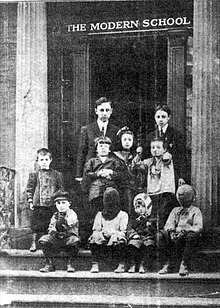William James Durant
William James "Will" Durant (born November 5, 1885 in North Adams , Massachusetts , † November 7, 1981 in Los Angeles , California ) was an American philosopher and writer .
Life
Will Durant, son of French Canadian parents, attended schools in Jersey City . He worked first as a journalist, then as a teacher. At Ferrer Modern School in New York , he fell in love with a young student, Chaya Kaufman . He gave up his teaching profession and married Chaya - whom he initially called Puck , later Ariel - in 1913; they had a daughter, Ethel, and an adopted son.
Socialist since 1905, he fought for equal wages, women's suffrage and better working conditions for American workers. He wrote a number of books and newspaper articles on these subjects and tried to bring his new ideas (and later his philosophical and historical accounts) closer to ordinary people.
In 1917 he received his doctorate in philosophy from Columbia University . With his philosophy story The Story of Philosophy he achieved both great popularity and financial independence, which allowed him and his wife to travel to all continents and (from 1927) to work on their main work together for four decades: The Story of Civilization . His wife was a co-author from the start, but was only mentioned by name from Volume 7 onwards. For the 10th volume of this extensive human history (Durant himself spoke of an integral history ) they received the Pulitzer Prize in 1968 in the "Non-fiction" category. Since 1959 he was a member of the American Academy of Arts and Letters .
In 1981 he and his wife, Ariel Durant, died in quick succession in Los Angeles.
Works
Books
A complete bibliography is here to find.
-
The Story of Philosophy. the Lives and Opinions of the Greater Philosophers , Simon and Schuster, New York 1926
- German: The great thinkers . With a foreword v. Hans Driesch, Orell Füssli, Zurich undated (1930)
- as Bastei-Lübbe paperback, translated and edited by Andreas Hecht: Bergisch Gladbach 1980, ISBN 3-404-63055-6 .
- Transition. A Sentimental Story of One Mind and One Era , Simon and Schuster, New York 1927
-
The Mansions of Philosophy. A Survey of Human Life and Destiny , Simon and Schuster, New York 1929
- revised edition as: The Pleasures of Philosophy , Simon and Schuster, New York 1953
- The Case for India , Simon and Schuster, New York 1930
- A Program for America , Simon and Schuster, New York 1931
- Adventures in Genius , Simon and Schuster, New York 1931
-
On the Meaning of Life , Ray Long and Richard R. Smith, New York 1932
- New edition: Promethean Press, Dallas 2004
Books (together with Ariel Durant)
-
The Story of Civilization , 11 vol., Simon and Schuster, New York 1935-75
- German first edition: The history of civilization or (from 1956) the cultural history of mankind , 10 volumes, Francke, Bern / Munich 1946–69
- first complete edition: Kulturgeschichte der Menschheit , 18 volumes, Südwest, Munich 1978
- German first edition: The history of civilization or (from 1956) the cultural history of mankind , 10 volumes, Francke, Bern / Munich 1946–69
-
The Lessons of History , Simon and Schuster, New York 1968
- German The Lessons of History , Francke, Bern / Munich 1969
- Interpretations of Life. A Survey of Contemporary Literature , Simon and Schuster, New York 1970
- A Dual Autobiography , Simon and Schuster, New York 1977, ISBN 0-671-23078-6
Films (together with Ariel Durant)
- Journey , Robert Cohn Productions, 1973
- A Visit with Will and Ariel Durant , Northern River Productions, 2003
Quote
- "A superior culture cannot be conquered from without as long as it has not destroyed itself from within."
Web links
- Literature by and about William James Durant in the catalog of the German National Library
- Works by and about William James Durant in the German Digital Library
- Captivating philosophy . Obituary for the 25th anniversary of Durant's death by Barbara Jentzsch (DKultur)
Individual evidence
- ^ Members: Will Durant. American Academy of Arts and Letters, accessed February 27, 2019 .
- ↑ From the epilogue to Caesar and Christ (The History of Civilization, Volume 3), Bern 1949
- ↑ Original: "A civilization is not conquered from without until it is destroyed from within."
| personal data | |
|---|---|
| SURNAME | Durant, William James |
| ALTERNATIVE NAMES | Durant, Will |
| BRIEF DESCRIPTION | American philosopher and writer |
| DATE OF BIRTH | November 5, 1885 |
| PLACE OF BIRTH | North Adams , Massachusetts |
| DATE OF DEATH | November 7, 1981 |
| Place of death | Los Angeles , California |
